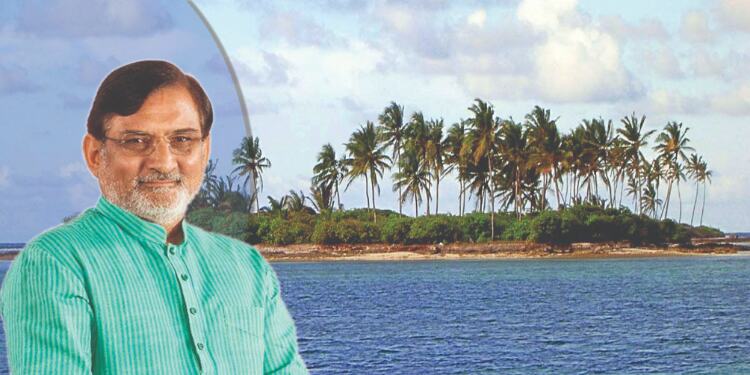Untranquil waters
Lakshadweep Administrator's recent policies have the islanders up in arms with an impassioned #SaveLakshadweep campaign gathers national momentum

It was social media to the rescue again this week. The raging discontent within India's smallest Union Territory, Lakshadweep, came to the fore driven by social media campaigns. Posts shared on digital platform amplified the furore among locals over the newly introduced policies. For most of us trapped deep within the news of Covid mismanagement, vaccine shortage, and untimely deaths, it almost seemed like a surreal news piece. A friend sent me one of the posts on Instagram, which immediately piqued my interest, as it did for many commentators and journalists, resulting in much-needed attention being paid to the cluster of islands.
The locals of this beautiful tropical archipelago, which consists of 36 tiny islands, have never made as much noise as they have today. Their anger is squarely aimed at what they term to be "anti-people" policies of the administrator, Praful Khoda Patel. It's surprising that while Lakshadweep has always had an IAS or IPS officer as Administrator, Patel is neither. The BJP leader from Gujarat was given additional charge in December last year upon the demise of then administrator, Dineshwar Sharma. He is also the Administrator of Daman and Diu, and Dadra and Nagar Haveli, and has been mired in controversy earlier this year. Dadra and Nagar Haveli MP Mohan Delkar named Patel among others in his suicide note in February this year. The seven-time MP's son, Abhinav, blamed Patel for his father's death by suicide and alleged that the administrator wanted to usurp land and was pressuring Delkar to give Rs 25 crore or be embroiled in a fake case.
In the case of Lakshadweep, land-grabbing is one of the primary concerns of the less than 65,000 islanders. They say that under the garb of development, the Lakshadweep Development Authority (LDAR) 2021, which is currently in the public domain as a draft for comments and feedback, is stealing the land rights of locals. If the LDAR is ratified it will give the Administrator sweeping powers to remove and relocate locals from their property in the name of town planning or development.
Also, in the eye of the storm, that has been created in the tranquil waters of Lakshadweep, are Patel's other policies that have angered the locals. Patel also brought in the Prevention of Anti-Social Activities Act (PASA) or the 'Goonda Act' in January this year. Locals claim that the almost crime-free Lakshadweep never needed promulgation of a law like this unless it was specifically done to intimate, scare, and silence the dissenting locals. The dilution of Covid-19 protocols has caused a staggering rise in the number of active Covid cases from zero in January this year to almost 7,200 by May-end.
Some of the other policies are plain bizarre — anyone with more than two children won't be allowed to contest elections. How can such a diktat be passed that is not applicable to the rest of the country? Lakshadweep has a Muslim majority and as such, beef is allowed while alcohol isn't. The Administrator now wants to ban beef and allow liquor bars. While I'm no supporter of bans on either, the premise of changing the policy for Lakshadweep itself is flimsy. The Administrator says he wants to turn Lakshadweep into Maldives. Perhaps he got the idea on watching every second Bollywood celebrity making a beeline for the south Asian country.
Of course, there is a security angle to this. With China strengthening its presence in Sri Lanka and Maldives, both very close to the Indian shores, Indian armed forces would want to fortify their foothold in Lakshadweep. Tourism dreams are fine too but no policy should be thrust on people. Places such as Lakshadweep or Andamans and Nicobar have a delicate ecological balance. How many tourists can its resources handle? What is being planned to safeguard the coral reefs? The fishing community has their 'customary ownership', the locals have their rights, and their own culture, and ethos. There can be no development unless it has the acceptance and support of the natives of a place, especially in a place like Lakshadweep. Even around the world, the leaning is more towards creating an inclusive, culturally sensitive, environmentally sustainable tourism that has the approval of the locals. Therefore, the locals must be taken into confidence, and all development must take their sentiments and ambitions into consideration. Stymieing the rights of natives and indigenous people o Lakshadweep is not the answer, only transparent dialogue is.
The writer is an author and media entrepreneur. Views expressed are personal



